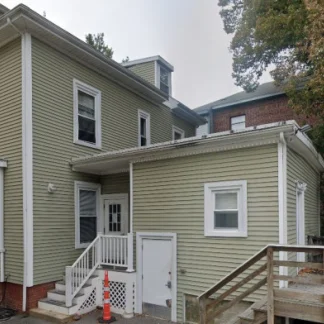North Shore Medical Center - Outpatient
North Shore Medical Center – Outpatient is a private rehab located in Lynn, Mass...
Lahey Health Behavioral Services - The Ryan House & Transitional Support offers a halfway house for those men and women in recovery and a transitional residential program for those waiting for a bed in a halfway house. Lahey Health Behavioral Services - The Ryan House & Transitional Support is located at Lynn, Massachusetts.
Lahey Health Behavioral Services – The Ryan House & Transitional Support is dedicated to provide substance abuse and other related issues to men and women seeking for help. All clients are treated with dignity, respect and the belief that everyone has the ability to grow when they are provided support, education and direction.
The Ryan House provides a clean and sober environment to those individuals who seek recovery from addiction and related mental health issues. The house is a co-ed program with separate houses for men and women that offer 24-hour supervision and comprehensive, individualized plans for each client. All clients must be willing to participate in community services, group therapy, 12-Step programming, and hold a job while living at the program. The duration of treatment varies, but the average length of the stay is typically six months.
Services include group and individual therapy, employment counseling, relapse prevention, anger management, life skills training, daily self-help meetings and more.
Since the program is funded through the Massachusetts Department of Public Health, Bureau of Substance Abuse Services. After the client is able to re-enter the workforce, he/she will pay treatment fees that equal half of the income, the money is then funded back in order to care for future clients.
Contact us for more information: (781) 593-9434

Connect with Lahey Health Behavioral Services - The Ryan House & Transitional Support by calling their admissions team directly.
(781) 593-9434 Website Get DirectionsGroup therapy is any therapeutic work that happens in a group (not one-on-one). There are a number of different group therapy modalities, including support groups, experiential therapy, psycho-education, and more. Group therapy involves treatment as well as processing interaction between group members.
In individual therapy, a patient meets one-on-one with a trained psychologist or counselor. Therapy is a pivotal part of effective substance abuse treatment, as it often covers root causes of addiction, including challenges faced by the patient in their social, family, and work/school life.
Life skills trainings involve all the skills a person must have in order to function successfully in the world. These include time management, career guidance, money management, and effective communication. Truly successful addiction recovery is based on the ability to not only live substance-free, but to thrive. Life skills teaches the practical necessities of functioning in society, which sets clients up for success in life, and therefore sobriety.
In individual therapy, a patient meets one-on-one with a trained psychologist or counselor. Therapy is a pivotal part of effective substance abuse treatment, as it often covers root causes of addiction, including challenges faced by the patient in their social, family, and work/school life.
Life skills trainings involve all the skills a person must have in order to function successfully in the world. These include time management, career guidance, money management, and effective communication. Truly successful addiction recovery is based on the ability to not only live substance-free, but to thrive. Life skills teaches the practical necessities of functioning in society, which sets clients up for success in life, and therefore sobriety.
Life skills trainings involve all the skills a person must have in order to function successfully in the world. These include time management, career guidance, money management, and effective communication. Truly successful addiction recovery is based on the ability to not only live substance-free, but to thrive. Life skills teaches the practical necessities of functioning in society, which sets clients up for success in life, and therefore sobriety.
North Shore Medical Center – Outpatient is a private rehab located in Lynn, Mass...
Beverly Hospital is a not for profit medical facility offering drug and alcohol ...
South Bay Community Services - Lynn Mental Health Clinic treats each individual ...
Family Continuity Peabody is a private rehab located in Peabody, Massachusetts. ...